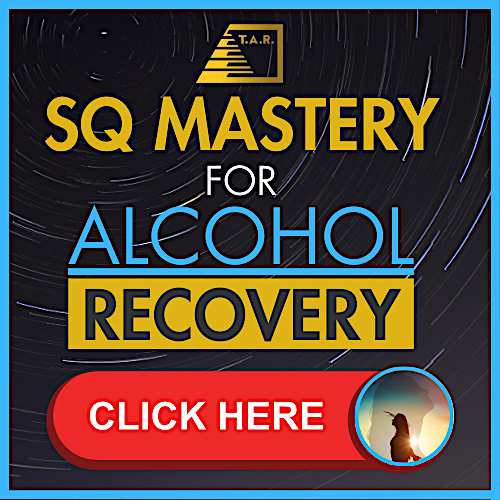
I’ll never forget the most insane thirteenth-stepper story I heard about when I was an active member of Alcoholics Anonymous (AA). I heard it directly from the 50-year-old man with a decade of recovery who thirteenth-stepped a teenage girl in her first 30 days of sobriety in AA.
I saw both men and women 13th-stepping at AA and Narcotics Anonymous (NA) meetings when I used to attend. Still, after researching the topic, I’ve learned this is an even more widespread issue than I had estimated.
Documentaries, research studies, articles, podcasts, news segments, and more have documented this dark side of Twelve-Step recovery.
So…
What is this “13th Step,” and how can it be possible in a program with only 12 steps?
I’m glad you asked.
In this article, you’ll discover:
- The Definition of “13th Step.”
- My Experience Witnessing 13th-Steppers 13th Stepping.
- Why People Work this Unofficial Step.
- The Negative Consequences of this Behavior.
- How to Avoid Being 13th-Stepped.
- How to Recover from 13th-Step Trauma.
Furthermore, I’ll share what the research says and what victims have shared, and I’ll provide you with additional helpful resources to support your learning journey.
Let’s begin with the definitions of step 13 and a 13th stepper.
What is Step 13?
There are only 12 steps in Twelve-Step programs. Step 12 of Alcoholics Anonymous says, “Having had a spiritual awakening as the result of these Steps, we tried to carry this message to alcoholics, and to practice these principles in all our affairs.”
Unfortunately, many “old-timers” who’ve completed the Twelve Steps add an “unofficial step” to their programs.
However, an individual doesn’t need to have completed any steps to engage in this predatory behavior at meetings.
Step 13 refers to “any person in a Twelve-Step group who sexually preys on someone with less than a year of sobriety.”

13th Stepping — Urban Dictionary Definitions
There are some accurate definitions of this colloquial term “13th step” in Urban Dictionary that will help to explain this further. However, from this point in the article, some of the content is explicit and may be triggering.
Thus, you deserve a trigger warning.
Now that you’ve been warned…
Two people posted the following about 13th Stepping on Urban Dictionary:
“The 13th step is used to describe the efforts of an old timer who tries to screw a newcomer or someone with less than one year of sobriety.” – Rich V.
“This is a term used for recovering addicts and alcoholics in the rooms of AA and NA. It is when a person with more than one year of sobriety becomes sexual with a newcomer in recovery. This method is successful because people with less than one year clean have extremely low self-esteem and are in a vulnerable state where they need to be comforted. Typically, a man 13th steps a woman, but the reverse is equally possible.” – Broseph 2891
—Urban Dictionary

My Experience with 13th Steppers 13th Stepping
Twenty years ago, I attended my first 90 AA meetings in 90 days in a beach town in Southern California with a large population of surfers and other individuals with alcohol and/or drug problems.
While staying alcohol-and-drug-free in the program, I experienced the “Pink Cloud” phenomenon. The Pink Cloud is a not uncommon experience in Early Recovery where you feel serenity, spiritual growth, natural joy, and the feeling that everything works for your highest good.
During these 90 days, I don’t recall witnessing any 13th-stepping behavior. Still, I was a newbie, high on the Pink Cloud, and trying to stay out of prison by staying on the path of recovery and responsibility.
However, I was a member of Alcoholics Anonymous for almost a decade. Over the years at my home group, I probably personally witnessed and heard about more than 100 unique situations where the unofficial Step 13 had been “worked.”
I commonly saw old (and unattractive) men with decades of sobriety hitting on teenage or 20-something-year-old girls with fewer than 90 days sober.
What’s more?
A lot of the time, their strategies and tactics worked, and they were able to have sex with or even relationships with the much younger girls, still fragile, vulnerable, and often unable to notice or at least put up effective boundaries to 13th-step advances.
The most insane Step 13 story I’ve ever heard involves two individuals who will remain anonymous, obviously.
The 13th stepper was a 50-year-old male with a decade of sobriety in great mental health, and the female target was a teenager who was new to town and had less than 30 days in AA and recovery, bipolar spectrum disorder, and ADHD. Not only did he successfully put the moves on, he also got her to move in with him.

Yet the net result after only a few months was massive negative consequences to both of their lives, their mental health, and her sobriety.
The girl ended up getting 13th-stepped by other older men and eventually raped by someone in AA.
Why Do 12-Steppers 13th Step?
All human behavior, including 13th-stepping behavior, is driven by avoiding pain and seeking pleasure. Additionally, all human behavior is driven by the same Six Human Needs: Certainty, Uncertainty, Significance, Love/Connection, Growth, and Contribution.
There are four basic Human Needs essential for human survival and two spiritual needs of the soul (Growth and Contribution) that are required for human fulfillment.
Everyone meets the four basic needs, even if they have to meet them in ways that are negative, disempowering, and destructive. Most people aren’t fulfilled because their spiritual needs are not being met.
Here is a brief overview of the Six Human Needs (four basic and two spiritual):
- Certainty – Assurance you can avoid pain and gain pleasure.
- Uncertainty – The need for the unknown, change, and new stimuli.
- Significance – Feeling unique, important, special, or needed.
- Love/Connection – A strong feeling of union or closeness with someone or something.
- Growth – An expansion of capacity, capability, or understanding.
- Contribution – A sense of service and a focus on helping, giving to, and supporting others.
These behavioral factors don’t make it acceptable, although they can provide deep insight into motives that at least make it understandable.
Now that you’ve learned the drivers underneath all human decision-making and behavior (including 13th-stepping), the examples below are better framed.
Here are some of the main reasons both men and women do “13th step work”:
- Physical – They’re horny and want to have sex.
- Emotional – They’re lonely and want a connection.
- Financial – They’re broke and want to eat, pay bills, rent, etc.
- Practical – They’re about to be homeless and need a place to stay.
- Addictive – They’re a sex addict who is not in recovery for it – or is but relapsing.
- Spiritual – They’re of the negative, aka service-to-self consciousness polarity, that seeks to control, dominate, and enslave others for selfish gain (opposite of positive, aka service-to-others consciousness in recovery).
Typically, making sexual advances toward a newcomer to sobriety and Twelve Step recovery involves multiple reasons, e.g., physical/emotional or physical/emotional/financial, etc.
However, there is usually a primary reason, such as getting laid, having a free place to live, soothing loneliness, etc.
The Negative Consequences of 13th Stepping
Now that you’ve discovered the reasons that don’t condone but do drive and explain this type of behavior let’s discuss the many dangers that result from 13th stepping.
Possible dangers of 13th stepping include, but are not in the slightest limited to:
- Slips – Return to using alcohol or other drugs for a brief amount of time.
- Relapses – Return to a lifestyle of active alcohol or other drug addiction.
- Financial Loss – Paying for their food, bills, rent, and unnecessary items.
- Psychological Distress – Such as anxiety, depression, panic attacks, and more.
- Trauma/PTSD – From perceiving the experience to be so painful.
- Loss of Reputation – From other 12-Step members not condoning the behavior.
- Loss of Home Group – Avoiding the person who did it previously.
- Pregnancy – From having unprotected sex with someone you don’t want to be with long-term and being new to sobriety. Also, the potential for sexually transmitted diseases.
- Suicide – From experiencing so much trauma, fear, shame, etc, and not feeling able to cope with it. Note: The National Suicide Prevention Lifeline offers services to talk to a skilled counselor. If you are distressed and need to talk to a counselor, please call 1-800-273-TALK (8255).

At this point, I should also mention that positive consequences have resulted from 13th steppings, such as healthy long-term relationships, marriages, families, and more.
That being said, the outcomes are generally not ideal for the 13th-stepped individual.
Research on 13th-Stepping — How Common is it?
In a survey study published in the Journal of Addictions Nursing titled, 13th-Stepping: Why Alcoholics Anonymous Is Not Always a Safe Place for Women, the objective was to describe the frequency of various 13th-stepping experiences in a sample of women involved in AA.
According to the study:
“Results showed that at least 50% of the participants had at least occasionally experienced seven of the thirteen 13th-stepping behaviors listed in the survey. Two of the study participants volunteered that men they met in AA had raped them.”
—Cathy Bogart and Carol Pearce, Journal of Addictions Nursing
The authors of the survey study also provide strategic advice, ending the piece with this…
“Chemical dependency treatment providers be aware of 13th-stepping in AA, particularly when treating women. Especially vulnerable women, such as those with histories of sexual abuse, should be referred to female-only groups when possible. When women’s groups are unavailable, women should be adequately prepared to protect themselves from 13th-stepping.“
Here are nine more tips you can meditate on and take action on to proactively prepare yourself and prevent 13th-steppers from having another easy target to prey upon.
10 Steps to Avoid Being 13th-Stepped
Both men and women have preyed upon vulnerable members of Twelve Step groups, although men engage in this type of behavior much more frequently.
If you attend AA or NA meetings and want to protect yourself from this type of person and shameful behavior, this section will help you to do so.
Some chronic thirteenth-stepping predators know what they’re doing. They’ve practiced it many times and have the process down to an art and science.
They know how to identify the easiest targets quickly, have strategies and tactics that are hard to resist, and vulnerable, newly sober individuals often don’t stand a chance to their cunning ruse.
The fact is, AA and NA groups contain murderers, rapists, sociopaths, sexual predators, sex addicts, pedophiles, human traffickers, liars, cheaters, thieves, conmen and women, narcissists, mentally ill, and more.

Why?
“The only requirement for membership is a desire to stop drinking.”
If you’ve never attended AA, the easiest way to avoid being taken advantage of is not to start. If you’re an AA member or thinking of becoming one, being proactive can help you stay safe.
Here are ten steps to help you avoid being 13th-stepped in AA:
- Stick with a women- or men-only group (or at least for your home group).
- Commit yourself to not date until you’re secure in your recovery (in AA, the recommendation is to wait one year, but each situation is unique).
- Learn about, foster, and nurture healthy boundaries (e.g., not too porous or rigid).
- Always check if another person’s suggestion (or command) is in the literature, and ask your sponsor and another member.
- Avoid flirting, dating, and wearing provocative clothing.
- Try to only socialize with the same sex and stay focused on recovery.
- Be aware of and on guard for individuals befriending you, and be highly conscious of red-flag behavior (including your sponsor – if they hit on you, get a new sponsor).
- Use wisdom and discernment, take it slow when meeting new people at AA, and watch out for individuals who date newcomers. Then, stay clear of them!
- Read page three of the AA.org PDF Safety and A.A.: Our Common Welfare – which has protocols from the General Service Office on how to deal with sexual harassment or stalking and other inappropriate behaviors (e.g., financial coercion, predation, bullying, and more).
- Crowd out both alcohol AND sexual advances in your Early Recovery by diligently working the Steps with your sponsor and developing and maintaining an alcohol-free life of meaning and purpose, mind/body/spirit health, fulfillment, growth, contribution, and true freedom.

How to Recover from 13th-Step Trauma
In many cases, engagement in the 13th step has led to traumatization in the short and long term. When trauma results from being taken advantage of or even worse, there are steps a person can take to heal from it.
However, mainstream treatments, therapies, and interventions only address the mental aspect of trauma. Thus, healing is often slow (and never complete) as trauma embeds itself in the mind, brain, body, and spirit.
One of the modules in my course, Make Alcohol Moot Again With Mindset Mastery, covers this type of complete trauma healing. I posted an informative YouTube video about this course portion, in which you’ll learn an effective three-step mind/body/spirit trauma healing system.
Additionally, there are some extraordinary books, workbooks, therapists, podcasts, videos, and other resources on mainstream and integrative trauma healing modalities that can be helpful.
Recommended 13th Step Resources
Since you’ve read to this point, you’re probably resonating with this information, and if so, perhaps you’d like to continue exploring this topic further.
I’ve curated a list of my three favorite 13-step resources for you to learn about below.
Here are three 13-step resources that you may find helpful…
1) The 13th Step Podcast (2023)—This new podcast is by Lauren Chooljian, an award-winning document team member and investigative reporter. The series has six episodes and is about the longstanding and long-tolerated culture of sexual misconduct in the American addiction treatment industry. “This series is about failures in an industry that is supposed to be dedicated to healing. It’s also about the limits of the #MeToo movement. And journalism. How deep can you dig for the truth before it gets dangerous?”
2) The 13th Step Documentary (2016)—A critical expose of Alcoholics Anonymous. A five-year investigation ensued when an AA member killed a mother & child in Honolulu. They discovered that the court ordered violent/ sexual offenders to AA meetings, unknown to the public. The 13th Step is a documentary on America’s substance abuse issues, sexual predators in Alcoholics Anonymous; offenders court-ordered to AA meetings, alternatives to 12-step that are science-based or secular options, and more.
3) Everything You Need to Know About the 13th Step in AA (2023)—Here’s an article published on the Addictions.com blog. The author has experience with addiction and being 13th-stepped in AA — and has been in recovery and healthcare since 2010.
Here is what she says about a 13th-step experience at AA.
“I had an experienced member take advantage of my good nature and vulnerability. Tony befriended me, or so I thought, in my first month of recovery. He invited me to coffee, and it wasn’t long before he was inviting himself to my apartment.”
“He’d ask me to pick up tabs for food, overstay his welcome in my home, and get inappropriately close to me, telling me that he had to wait a year to make a move. I’m not saying I was innocent — I opened the door and got out my wallet, but I didn’t have the resources to set effective boundaries or the experience to know that he was taking advantage of his power and my vulnerability.”
—Nikki Seay

Conclusion — 12-Step recovery is imperfect, and so are human beings
As authors Bogart and Pearce from the study mentioned earlier explain, “‘Thirteenth-stepping’ is a euphemistic term used among members of Alcoholics Anonymous (AA) to refer to people (particularly men) who target new, more vulnerable members (typically women) for dates or sex. Previous research suggests that women frequently experience sexual harassment in AA meetings and even in chemical dependency treatment settings.”
It is even possible that sponsors may be “thirteenth-steppers.”
For example, in the podcast from the resource section above, The 13th Step, reporter Lauren Chooljian details allegations regarding the sexual harassment and assault of women recovering from addiction by the founder of a rehab center.
Additionally, there are ten strategic and proactive steps new and existing members of AA can take to prevent being 13th-stepped.
Finally, for individuals who’ve been victimized by unwanted 13th-stepping, there are effective solutions for healing from trauma.
The Final Verdict on AA
AA is an imperfect recovery resource filled with imperfect people. Unfortunately, there is also a high percentage of people (mostly men) who take advantage of other AA members (mostly women) by 13th-stepping them. Some women get raped by AA members.
The fact is…
Research studies on Alcoholics Anonymous’s effectiveness suggest that AA has a 5-10% success rate on the low estimations and an 8-12% on the high.
My take: AA is an extraordinary resource for some people, an average resource for others, and a terrible one for others. For vulnerable women (and also men), it could be a resource that leads to more harm than help.
Author
-
Matt Finch, the Fit Recovery Head Coach, embodies the power of transformation. With over 13 years of freedom from both alcohol and opioids, he has turned his personal journey into a beacon of hope for others. Previously a Certified Substance Abuse Counselor at an outpatient treatment center, he has dedicated his life to empowering individuals to break free from the chains of addiction. Through his innovative recovery coaching programs, he has joined forces with Chris Scott and Fit Recovery, inspiring thousands to overcome their struggles. By offering one-on-one recovery coaching, engaging group sessions, and dynamic online courses, along with his uplifting podcast, "The Matt Finch Show: Fit Recovery 2.0 Members-Only Alcohol-Free Lifestyle Podcast," he illuminates a path to a healthier, addiction-free lifestyle.
View all posts Fit Recovery Head Coach









